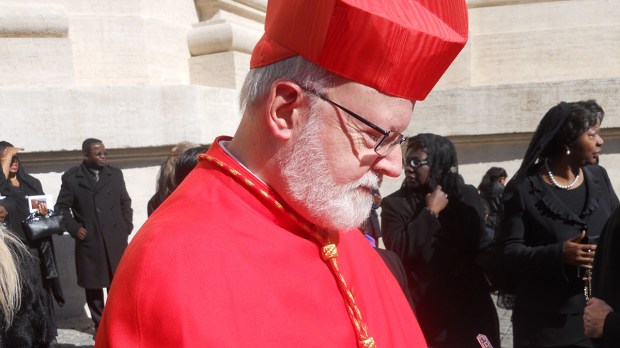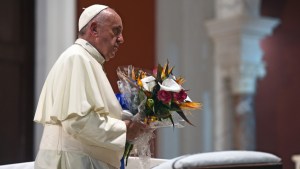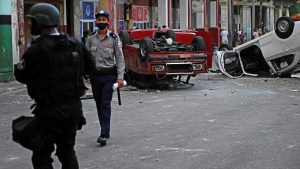Boston Cardinal Sean O’Malley, a member of Pope Francis’ council of cardinals, paid a visit to the president of Cuba on Thursday, and appealed for clemency for those involved in massive street protests this summer.
On his way to visit the Dominican Republic and earthquake-devastated Haiti, Cardinal O’Malley, widely regarded as one of the pope’s most trusted advisers, paid a visit to Miguel Diaz-Canel, president of Cuba.
“Cuban state media published images of the meeting, but gave no details on what had been discussed, though a battery of senior Cuban officials attended, including Foreign Minister Bruno Rodríguez, the Communist Party’s ideology chief and the head of the Foreign Ministry’s office of U.S. affairs,” the Associated Press reported. “The cardinal made no public comments on politics.”
Diaz-Canel has been portrayed as leading a severe repression of spontaneous street protests in Cuba this summer, which included calls for reforms and rejection of Cuba’s communist regime. Priests and other representatives of the Catholic Church played prominent roles in the protests, and many were arrested.
Cardinal O’Malley wrote on his blog Friday that he spoke to to Diaz-Canel about the protests “and appealed for clemency for those involved in the demonstrations in a nonviolent way.”
One aspect of the protests dealt with Havana’s poor handling of the COVID-19 crisis. During O’Malley’s visit, he was treated to a tour of the Center of Genetic Engineering and Biotechnology, where a Cuban vaccine against the coronavirus has been developed. AP said that Cuba is the only country in Latin America to have developed its own vaccines against COVID-19 — three of them, in fact.
“For us as Catholics, health is a very important subject, beginning with the example of Jesus Christ, who dedicated so much of his ministry to caring for the sick,” the visiting cardinal commented.
His visit to the laboratory followed a Wednesday evening Mass in honor of Cuba’s patron saint, the Virgin of Charity.
The cardinal’s blog
Cardinal O’Malley also wrote on his blog that he and the Cuban leader “spoke about the desire of the Catholic agencies to be able to support the work of Caritas Cubana, which is their Catholic Charities on the island. The Church does a great deal of work with the elderly, which is a very large population in Cuba, as well as work to address the scarcity of food and medicines. So, we were appealing to the president to make it more possible for Catholic Relief Services and Caritas Internationalis to be able to send aid to Cuba through the Catholic Charities organizations of the dioceses of Cuba. We also wanted to encourage them to have more direct contact with the bishops of Cuba.
“The government of Cuba is, of course, very concerned that the remittances Cuban-Americans were sending to their relatives are now much more difficult to receive and that the travel possibilities to Cuba have also been greatly restricted,” he continued.
“It was a very cordial meeting, and I gave the president the gift of a copy of the Holy Father’s latest encyclical, ‘Fratelli tutti.'”
“A special, charitable relationship”
Victor Gaetan, author of God’s Diplomats: Pope Francis, Vatican Diplomacy, and America’s Armageddon, added this background to the cardinal’s visit when asked for comment by Aleteia:
“As I explained in God’s Diplomats, the Archdiocese of Boston has had a special, charitable relationship with Havana stretching back to Cardinal [Bernard] Law and his Cuba point man, Bishop William Murphy, in the 1980s. Cardinal O’Malley inherited this relationship, which has remained steadfast despite ups and downs in the US-Cuba dynamic. The Church has long opposed sanctions against Cuba, which hurts regular people far more than the elite.
“Cardinal O’Malley meets with Diaz-Canel in the spirit of Pope John Paul II’s plea in 1998 when he arrived on the island: ‘May Cuba, with all its magnificent potential, open itself up to the world, and may the world open itself up to Cuba.’”



